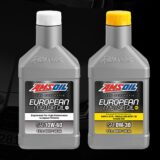
White paper: Future of marine two-stroke engine lubrication
According to a new white paper published by Chevron Marine Lubricants, ship operators will need thermally resilient, low-ash formulations and high cleaning performance from cylinder oils as they begin to use more advanced engines and new fuels.
The report, ‘The Future of Marine Two-Stroke Engine Lubrication’, features input from engine designers, MAN Energy Solutions and WinGD as well as the International Council on Combustion Engines, CIMAC. The result is a wide-ranging perspective funnelling into sharp insights on how emerging engine designs and the growing use of sustainable fuels will affect cylinder condition.
“Our mission is to help navigate uncertainty, delivering robust and reliable lubricant performance to keep engines operating cleanly whatever the fuel, whatever the design,” says Pat McCloud, general manager, Chevron Marine Lubricants. “This paper highlights the emerging needs that Chevron Marine Lubricants will have to fulfill to meet that mission.”
One finding in the paper is that, while fuels are dominating discussion in the maritime market, advancing engine efficiency will play an equally important role in defining marine cylinder oil performance demands. The higher pressures and temperatures used to achieve greater engine efficiency mean that lubricants will be needed that are more resistant to these challenging in-cylinder environments.
The increasing use of exhaust gas aftertreatment systems, as well as potential future engine designs to use new fuels, will accelerate demand for low-ash oils. Aftertreatments will increasingly be used to reduce air pollutants like sulphur and nitrogen oxides, and perhaps eventually capture carbon, in line with regulatory requirements. Post-combustion systems can be sensitive to ash deposits and new oil formulations will be needed to minimise this impact.
“Advanced engine designs and emerging fuels place a new challenge on cylinder oils. However, the fundamentals of cylinder lubrication remain the same—to keep cylinders clean and moving freely for as long as possible,” says Luc Verbeeke, senior engineer, Chevron Marine Lubricants. “Chevron Marine Lubricants has always been at the forefront of cylinder oil technology, and we are already well-advanced in meeting the emerging needs outlined in this paper.”
To download the white paper, click here.














